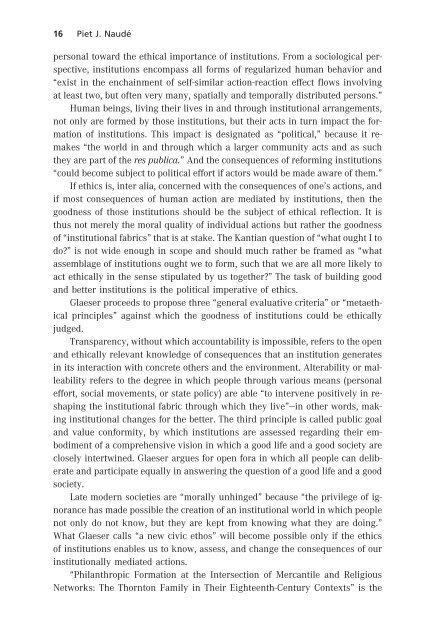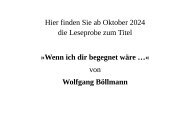Piet Naudé | Michael Welker | John Witte, Jr. (Eds.): The Impact of Political Economy (Leseprobe)
In our late modern pluralistic societies, there are tensions and complementarities between a plurality of individual and social claims and activities to shape societal life and a constructive pluralism of what is known as social systems. The latter provide normative codes and powers emanating from the areas of law, religion, the family, the market, the media, education, academic research, health care, defense and politics. A better understanding and steering of this complex division of powers is crucial for the common good and for freedom and peace. In this volume, a multi-disciplinary team of experts from Germany, Italy, Australia, the UK, the USA, and South Africa bring their conceptual, empirical and historical insights to bear in three broad sections: »The moral dimension of social systems«; »The interaction of religion, law and education with political systems«; and »The moral (mal)-formation evident in case studies on the global financial crisis and social media«.
In our late modern pluralistic societies, there are tensions and complementarities between a plurality of individual and social claims and activities to shape societal life and a constructive pluralism of what is known as social systems. The latter provide normative codes and powers emanating from the areas of law, religion, the family, the market, the media, education, academic research, health care, defense and politics. A better understanding and steering of this complex division of powers is crucial for the common good and for freedom and peace.
In this volume, a multi-disciplinary team of experts from Germany, Italy, Australia, the UK, the USA, and South Africa bring their conceptual, empirical and historical insights to bear in three broad sections: »The moral dimension of social systems«; »The interaction of religion, law and education with political systems«; and »The moral (mal)-formation evident in case studies on the global financial crisis and social media«.
You also want an ePaper? Increase the reach of your titles
YUMPU automatically turns print PDFs into web optimized ePapers that Google loves.
16 <strong>Piet</strong> J. <strong>Naudé</strong><br />
personal toward the ethical importance <strong>of</strong> institutions. From asociological perspective,<br />
institutions encompass all forms <strong>of</strong> regularized human behavior and<br />
“exist in the enchainment <strong>of</strong> self-similar action-reaction effect flows involving<br />
at least two, but <strong>of</strong>ten very many, spatially and temporally distributed persons.”<br />
Human beings, living their lives in and through institutional arrangements,<br />
not only are formed by those institutions, but their acts in turn impact the formation<br />
<strong>of</strong> institutions. This impact is designated as “political,” because it remakes<br />
“the world in and through which alarger community acts and as such<br />
they are part <strong>of</strong> the res publica.” And the consequences <strong>of</strong> reforming institutions<br />
“could become subject to political effort if actors would be made aware <strong>of</strong> them.”<br />
If ethics is, inter alia, concerned with the consequences <strong>of</strong> one’sactions, and<br />
if most consequences <strong>of</strong> human action are mediated by institutions, then the<br />
goodness <strong>of</strong> those institutions should be the subject <strong>of</strong> ethical reflection. Itis<br />
thus not merely the moral quality <strong>of</strong> individual actions but rather the goodness<br />
<strong>of</strong> “institutionalfabrics” that is at stake. <strong>The</strong> Kantian question <strong>of</strong> “what ought Ito<br />
do?” is not wide enough in scope and should much rather be framed as “what<br />
assemblage <strong>of</strong> institutions ought we to form, such that we are all more likely to<br />
act ethically in the sense stipulated by us together?” <strong>The</strong> task <strong>of</strong> building good<br />
and better institutions is the political imperative <strong>of</strong> ethics.<br />
Glaeser proceeds to propose three “general evaluative criteria” or “metaethical<br />
principles” against which the goodness <strong>of</strong> institutions could be ethically<br />
judged.<br />
Transparency, without which accountability is impossible, refers to the open<br />
and ethically relevant knowledge <strong>of</strong> consequences that an institution generates<br />
in its interaction with concrete others and the environment. Alterability or malleability<br />
refers to the degree in which people through various means (personal<br />
effort, social movements, or state policy) are able “to intervene positively in reshaping<br />
the institutional fabric through which they live”—in other words, making<br />
institutional changes for the better. <strong>The</strong> third principle is called public goal<br />
and value conformity, by which institutions are assessed regarding their embodiment<br />
<strong>of</strong> acomprehensive vision in which agood life and agood society are<br />
closely intertwined. Glaeser argues for open fora in which all people can deliberate<br />
and participate equally in answering the question <strong>of</strong> agood life and agood<br />
society.<br />
Late modern societies are “morally unhinged” because “the privilege <strong>of</strong> ignorancehas<br />
made possible the creation <strong>of</strong> an institutional world in which people<br />
not only do not know, but they are kept from knowing what they are doing.”<br />
What Glaeser calls “a new civic ethos” will become possible only if the ethics<br />
<strong>of</strong> institutions enables us to know, assess, and change the consequences <strong>of</strong> our<br />
institutionally mediated actions.<br />
“Philanthropic Formation at the Intersection <strong>of</strong> Mercantile and Religious<br />
Networks: <strong>The</strong> Thornton Family in <strong>The</strong>ir Eighteenth-Century Contexts” is the
















